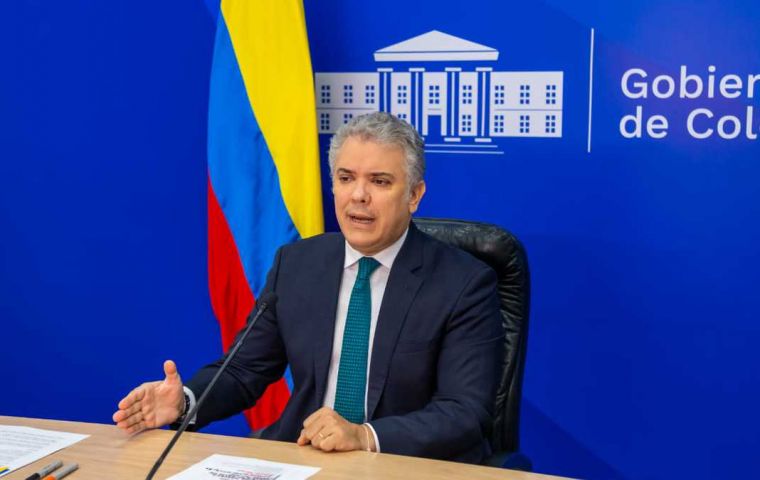MercoPress. South Atlantic News Agency
IACHR makes 40 observations to the Colombian Government regarding social protests
 The IACHR advised Duque against opposing roadblocks, to which the President disagreed
The IACHR advised Duque against opposing roadblocks, to which the President disagreed The Government of Colombia Wednesday received 40 recommendations from the Inter-American Commission on Human Rights (IACHR) following a visit to the country by an observation group.
The IACHR team drafted a report on the aftermath of social protests since last April which has left and left dozens of dead and wounded.
One of the main suggestions was to “promote and reinforce” a “genuine national dialogue” to allow “all sectors” to be heard, particularly those “most affected by historical, social and cultural discrimination.”
The Colombian administration of President Iván Duque was also advised to do whatever is necessary to ”reinforce public confidence“ and avoid stigmatization of the protesters by officials at all costs.
The IACHR delegation was on a ”working visit“ between June 8 and 10, during which time it heard 302 testimonies and received evidence from more than 500 people, including officials, victims, and civil organizations.
With all this data, the committee found ”the State's response“ to be “excessive and disproportionate,” particularly when it came to the use of force, which in many cases, turned out to be lethal.
The IACHR based its report on numerous sources, but official data alone between April 28 and May 5 show at least 51 dead, 21 of them in the context of the national strike, about 1,113 civilians injured, according to data provided by the Presidential Council for Human Rights and International Affairs, in addition to 18 people with eye injuries, according to the Ombudsman's Office.
Hence, the IACHR asked the Colombian State to ”respect and guarantee the full enjoyment of the right to protest, freedom of expression, peaceful assembly and political participation of the entire population.“
The IACHR also suggested separating the police from the Ministry of Defense, to ”consolidate and preserve security with a citizen and human rights approach“ and avoid ”any possibility of military prospects.“
Duque was even advised not to ban roadblocks automatically whenever a protest is announced, which made up for the bulk of the Government's rationale to justify repression.
In this scenario, the IACHR also announced the ”installation of a Special Follow-up Mechanism on Human Rights for Colombia that will contribute to the consolidation of peace in the various sectors of society.“
Bogotá's Foreign Ministry said it agreed with ”some of the observations“ made by the Commission, but withdrew from the possibility of establishing the human rights observation mechanism, noting that it is not necessary.
Regarding the separation of the police from the Ministry of Defense, the Government replied that the Constitution establishes that this institution is ”a permanent armed body of a civilian nature“, which drives away, according to the official view, the concern of the military approach.
The Government also rejected the ”suggestion of the alleged use of force against specific populations,“ which was explicit in the report, and criticized that some of the cited figures had not been verified, nor had the sources thereof.
”The government differs in that the blockades generally constitute a legitimate form of demonstration and that only in specific cases can the State act,“ the Foreign Ministry added.
Duque even stressed that ”no one can recommend that a country be tolerant to acts of crime,“ or ”acts of vandalism“, or of ”low-intensity urban terrorism“ and ” blockades that violate the rights of citizens.”
Meanwhile, Colombia's The General Labor Confederation of (CGT) and other trade union organizations representing state officials staged a sit-in Wednesday to demand that the government complied with labour agreements. The protest scheduled to take place in front of the Ministry of Finance had to be made in front of the Banco de la Republica.
Labour leaders said it was paradoxical that a government that opposes blockades had just blocked access to the Ministry of Finance to a peaceful and cultural protest.
The protesters criticized that Duque had endorsed and signed a salary increase to congressmen much higher than those for nurses, teachers and other civil servants. Why is the increase in state employees 0.19 per cent, while the increase in lawmakers is 5.12 per cent?, asked Jairo Arenas, teacher and social communicator.
Demonstrators also demanded that the government complied with collective bargaining, which constitutes a fundamental principle for the International Labor Organization.




Top Comments
Disclaimer & comment rulesCommenting for this story is now closed.
If you have a Facebook account, become a fan and comment on our Facebook Page!